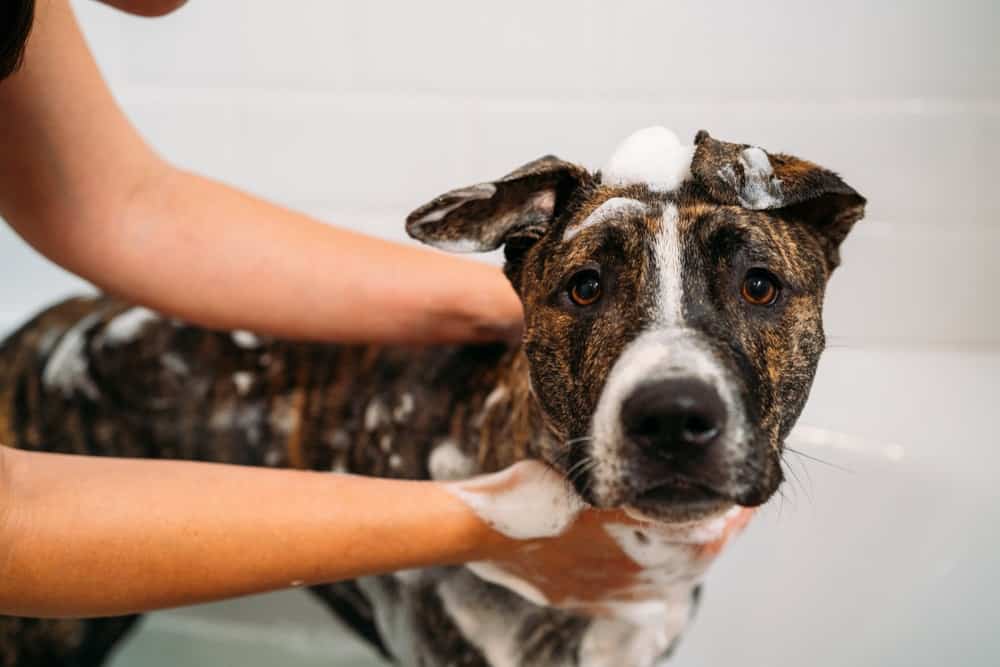9 Tips to Help Your Dog Overcome Allergies
Did you know that allergies can be a real pain for your dog?
Like their human parents, some dogs can develop allergies as well. Dogs can be particularly sensitive to heavy pollen, cleaning chemicals, cigarette smoke, perfumes, dust, mold spores, and other seasonal substances.

A dog’s allergy symptoms include:
- Sneezing repeatedly
- Runny nose
- Itchy swollen skin
- Redness around the armpits and groin area
- Excessive scratching, chewing or biting of the affected area
- Hair loss, hot spots, scabbing, and open sores on the skin
- Irritated eyes or rubbing of the face
Many dog owners struggle to watch their beloved furry friends suffer through uncomfortable and often painful conditions.
Read on to know the tips that can help you with the discomfort your dog may be dealing with due to allergies, and reduce the risk of developing more severe problems.
1. Limit Exposure to Allergens
Some dogs are prone to seasonal allergies, especially during the pollen peak seasons. This is because pollen comes mostly from grass, flowers, trees, and weeds.
To deal with seasonal allergies, consider adapting your walk routine to limit pollen exposure. Avoid early morning or later afternoon walks when pollen levels are typically high. Avoid the middle of the day as well because the sun will be at its hottest.
Instead, go for an evening walk with your furry friend and stay away from parks and fields where offending plants are common. Make sure to wipe your dog’s underside, paws, and legs after a walk to remove pollen so that they don’t traipse it around the house.

You might also want to consider an indoor play area during the pollen peak season to limit your dog’s exposure to allergens.
2. Clean Surfaces That Your Dog Comes Into Contact With
You can also address your dog’s allergy by sticking to a regular cleaning schedule off all the surfaces your dog sits on. A good place to start is the dog toys and beds since, with time, it becomes covered with allergens. Make sure to wash it in hot water at least once a week to limit allergen exposure.
Consider purchasing foam dog beds, as they are less likely to harbor common allergens such as dust mites.
It is a good idea to spread clean towels or blankets on top of yours, and your dog’s bed and other surfaces your dog likes to frequent for snuggles to keep offending allergens away from the surface.
3. Weekly baths with oatmeal
What’s so magical about an oatmeal bath, you ask?
Soaking in a homemade oatmeal bath is a remedy humans have used to alleviate skin problems for centuries. But people aren’t the only species that can benefit from an oatmeal bath.

The healing properties of oatmeal can help relieve many skin allergies, such as canine atopic dermatitis. This is because oatmeal contains anti-inflammatory properties that can help treat itchy and irritated skin. Instead of hot water, use lukewarm water as hot water can dry and irritate the skin further.
Also, a weekly oatmeal bath for dogs is soothing and helps the skin form a protective barrier that helps retain moisture and slows the loss of hydrating properties in your dog’s skin.
How do you do it?
- Blend 1 cup of whole oats in a blender until the oatmeal is a fine powder
- The oatmeal should be without additives such as sugar, flavor and other common ingredients
- Fill the bathtub with lukewarm water
- Pour and stir your powdered oatmeal into the tub
- Let your pet soak in the tub for 10 to 15 minutes
- Rub the oatmeal mixture into your dogs’ skin and fur
- Rinse your dog and pat him dry using a towel
- Lastly, brush appropriately to remove dead skin, excess hair, and fleas that may be contributing to the itchiness.
4. Regular Allergy Shots
Allergen-specific immunotherapy, or allergy shots, is the most effective way to help dogs with frequent and severe allergic signs throughout the year, sometimes resulting in a permanent cure. However, it is important to note that allergen-specific immunotherapy can take approximately six months to a year before realizing the results.
That said, some seasonal allergy shots have low side effects, and you can administer them at home under a professional veterinarian’s guidance.
Dogs with mild seasonal allergies respond well to over-the-counter oral prescriptions and medications that you can discontinue after the allergy season.
5. Clear The Air In Your Home
Allergens are lightweight and airborne, which means you can capture them using a high-quality air purification system. An effective plan to help your dog overcome allergies is to opt for an air purifier that uses a filter to cut down airborne allergens that enter through open doors and windows.

An air cleaning system provides a complete solution for your dog by destroying germs and attacking odors by pulling the air in your home through a series of filters that remove harmful particles.
You should also run an air conditioner or dehumidifier to help remove moisture from the interior air, thus discouraging mold growth.
Other methods of air purification include;
- Avoiding fragrances.
- Consider toxin-absorbing plants.
- Run fans in your bathrooms to reduce the risk of mold development.
- Clean your furnace and ac filters regularly.
- Keep the windows closed during the dog’s allergy season.
6. Avoid Unnecessary Medications And Vaccinations
There is no question that all dogs need to complete a series of vaccinations and other core vaccine boosters. However, vaccinations aren’t without risk, and it is safer to decrease the frequency of most shots given every year.
This is because a greater number of annual vaccinations can seriously harm your dog and increase the risk of vaccine reactions and allergies.
Ultimately, fewer and less frequent vaccinations are the way to go. A three-year interval is a good compromise decision with regular annual risk assessments to decide whether your furry companion needs non-core vaccines.
7. Give Your Pet Marine/Fish Oil Capsules.
Fish capsules contain Omega-3 fatty acids that have several potential benefits in dogs with allergic skin, especially in calming the body’s inflammatory reaction and improving the general condition of your dog’s skin.

When your furry friend has healthy skin, it acts as a natural barrier against allergens like pollens, mold, and dust mites, and also helps minimize allergic reactions, if any.
The inflammatory properties of Omega-3s help decrease the number of infections secondary to allergen exposure and self-trauma, such as scratching, chewing, or licking.
Consult your veterinarian to help you select a quality fish oil supplement and determine the correct dose for your dog.
8. Allergy Relief Skin Spray
Besides allergy shots, allergy relief skin sprays available in many pet supply stores can help relieve your dog’s itchy skin.
Fast-acting veterinarian formulated relief sprays can comfort and protect your dog from seasonal allergies caused by pollen, flea bites, and other irritants.
Another good upside of allergy relief skin sprays for dogs is that they have fewer side effects than if you were to use oral medication.
9. Manage Allergies With Nutrition
If your dog is susceptible to seasonal allergies, you might want to consider a diet with low grain content since food rich in carbohydrates can trigger or worsen inflammation.

Also, certain therapeutic foods are specifically formulated to help manage skin allergies in dogs. They offer an excellent option to supplement or even replace expensive allergy medications. The best part? It’s as easy as your regular feeding time for your furry friend!
You might also want to work with your veterinarian. Food trials are necessary to rule out a food allergy and look for ingredients that could be causing allergic reactions.
Final Thought
Dog allergies are prevalent. These allergies could be caused by many problems, with common symptoms that could be anything from itching, inflammation, scratching, rashes, and chewing.
Consult the veterinarian if you think your dog has an allergy and, more importantly, to help determine what your dog is allergic to. The good news is, methods discussed in this article could help you out with your pup’s allergies and make him more comfortable in these tough times.
References:
https://pethelpful.com/dogs/Help-My-Dog-Has-Allergies
https://www.petmd.com/dog/conditions/skin/c_dg_atopic_dermatitis
https://vetmed.illinois.edu/pet_column/immunotherapy-itchy-dog/
https://www.dogvills.com/best-hypoallergenic-dog-beds-for-pooches-with-sensitive-skin/






price for birth control pills https://birthcontrolpills.pro/# – birth control pills